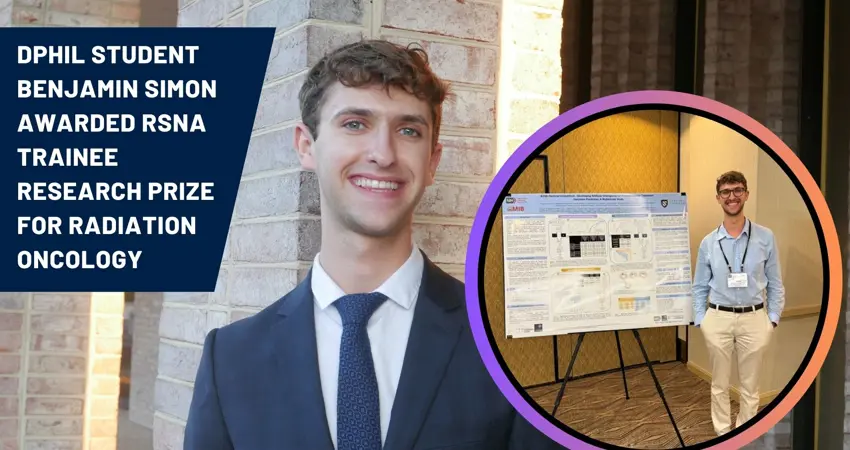21 Oct 2024
DPhil Student Awarded National RSNA Trainee Research Prize for Radiation Oncology
DPhil student, Benjamin Simon, has been awarded the prestigious Radiological Society of North America (RSNA) Trainee Research Prize in Radiation Oncology for his short paper submitted to the RSNA 2024 conference

DPhil student, Benjamin Simon, has been awarded the prestigious Radiological Society of North America (RSNA) Trainee Research Prize in Radiation Oncology for his short paper submitted to the RSNA 2024 conference.
Benjamin's research aims to address the gap in predicting outcomes using artificial intelligence (AI) for prostate cancer. He hopes this could eventually help to improve treatment for the disease, which accounts for over 25% of all cancer diagnoses, with approximately 300,000 new cases each year in the United States. “I think there is so much opportunity to improve treatments for prostate cancer patients, and AI could eventually become a tool to do that,” he says.
Prostate cancer is relatively treatable, with the key being early diagnosis and intervention and Ben’s research has resulted in AI models that help predict treatment outcomes, which are an important part of the process. “There is so much potential to detect features of images that might not be visible to the human eye”, he explains. It is exciting work methodologically, combining medical scans (MRI) along with “real-world” clinical data from patients’ hospital records.
Under the mentorship of Professor David Clifton of the Institute of Biomedical Engineering at Oxford and Dr Baris Turkbey at the NIH, Ben collaborated closely with physicians in radiology, radiation oncology, and surgery to identify areas where automation could enhance clinical practice. His efforts culminated in the development of a pilot AI model designed to predict radiation therapy outcomes. The initial results from a small dataset at the NIH were promising, prompting Ben to submit his findings to the RSNA for presentation at their upcoming conference in December.
The Radiological Society of North America is one of the largest radiology forums globally. This recognition comes with a monetary award of $1,000 and highlights Ben's significant contributions to the field of radiology. An NIH-Oxford Scholar, Ben splits his time between the NIH and Oxford, enriching his research experience on both sides of the Atlantic on projects that span the National Institutes of Health in addition to the Computational Health Informatics (CHI) Lab at Oxford.
Professor David Clifton praised Ben’s achievement, saying, “This recognition from the RSNA is an excellent accomplishment, particularly within the first year of his DPhil studies. Ben's work has the potential to significantly improve patient outcomes in prostate cancer treatment, and we are excited to see where this research leads.”
Ben adds of getting the award, “I'm excited to see that other scientists and physicians can see the work I've put in and the potential it could have to improve patient outcomes down the road. It took so much support from my mentors at both the NIH, Oxford, and our collaborators to get to this point, and I think there is still much more to come from this work”.




